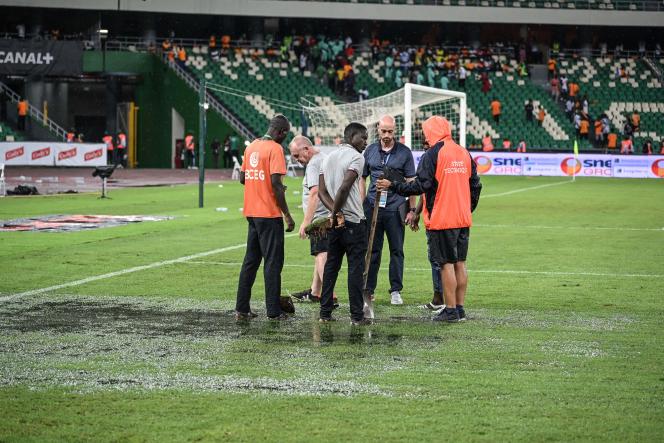” It is shameful ! » When the Ivory Coast-Mali friendly match was announced on the evening of September 12, Ivorian supporters did not hide their annoyance as they left the aisles of the Alassane Ouattara Olympic stadium in Ebimpé, located north of Abidjan. .
A few minutes before the end of the first period, torrential rain suddenly fell on the stadium. While on the field, the score of this highly contested match was 0 to 0 between the Ivorian Elephants and the Malian Eagles, the public rushed into the corridors of the stadium to take shelter, causing some movements of crowd and tensions. A rather precarious shelter since, very quickly, the corridors were also flooded.
“Bad signal”
Quickly, an emergency meeting was held between officials and match organizers. The referees returned to the field to assess its quality. As is the rule, the ball no longer bounced, the game was stopped, while on the set of Ivorian public television, the invited experts considered that interrupting the match would be a “bad signal”, four months before the start of the African Cup of Nations (CAN), which will be held in Ivory Coast from January 13 to February 11, 2024.
A few hours later, the general management of the National Sports Office (ONS), the project manager delegated by the Ministry of Sports, quickly gave some technical explanations. “It was observed that puddles of water had formed on the pitch, indicating slow drainage of the pitch. This situation could be due to the temporary overflow of the drainage system or to a problem with leveling the lawn, explains the ONS. However, we would like to point out that experts specializing in lawn maintenance and related infrastructure are currently being mobilized to immediately make the necessary corrections. »
Since the match, criticism has rained in the country while the 60,000-seat stadium, the largest and most important in the competition, must notably host the opening match and the final of the CAN. If some are scandalized, others have chosen derision. Nicknamed “Stado” – a contraction of stadium and Ado, the nickname of the Ivorian president – the venue is now nicknamed “Stade Adeau” on social networks.
Inaugurated in 2020, the building costing 143 billion CFA francs had already had to be taken back a year later, in particular due to the poor condition of its lawn. But the problem remains. “We renovated the stadium to the tune of 20 billion CFA francs, and today for a few minutes of rain, we can no longer continue. Where did our money go? asks supporter Ibrahima Doumbia. We are fed up, because today Ivory Coast is the showcase of West Africa. And that’s catastrophic. Let’s see the copy again! »
“Necessary adjustments”
For Jean-Louis Gasset, the Elephants coach, “We will have to ensure that water does not enter this lawn. When we know that we risk playing important matches in this beautiful stadium, there is perhaps something to think about.”. He also recalled at a press conference that in Bouaké, the country’s second city, a few months ago, the Elephants were able to train and then play on the pitch of the renovated stadium just after a storm, “because it was well drained”.
Initially scheduled for June and July 2023, the CAN was postponed from January 13 to February 11, 2024, in order to avoid the matches taking place in the middle of the rainy season. Although January is one of the least humid months of the year, it is not impossible for storms to occur at the end of the day.
“The facilities of this stadium, approved by the Confederation of African Football (CAF), are not in question,” underlined Amadou Coulibaly, the government spokesperson, at the end of the council of ministers which was held on Wednesday, the day after the match. If the minister rejects any possibility of sanction by a formula: “ I don’t know how you sanction heaven”this indicates that “cHowever, this exceptional situation allows us to make the necessary adjustments. »
Many spectators also pointed out the difficulties in accessing the stadium, some having walked for hours to get there. Problem which, according to Mr. Coulibaly, “will be resolved with the completion of the access roads under construction”. This full-scale test for Ivory Coast will therefore have been useful. “It’s good to organize matches to see the flaws that exist in the different stadiums,” notes supporter Mohamed Sanogo, before concluding: “What has just happened is a great shame for us, but we will make up for it. »
